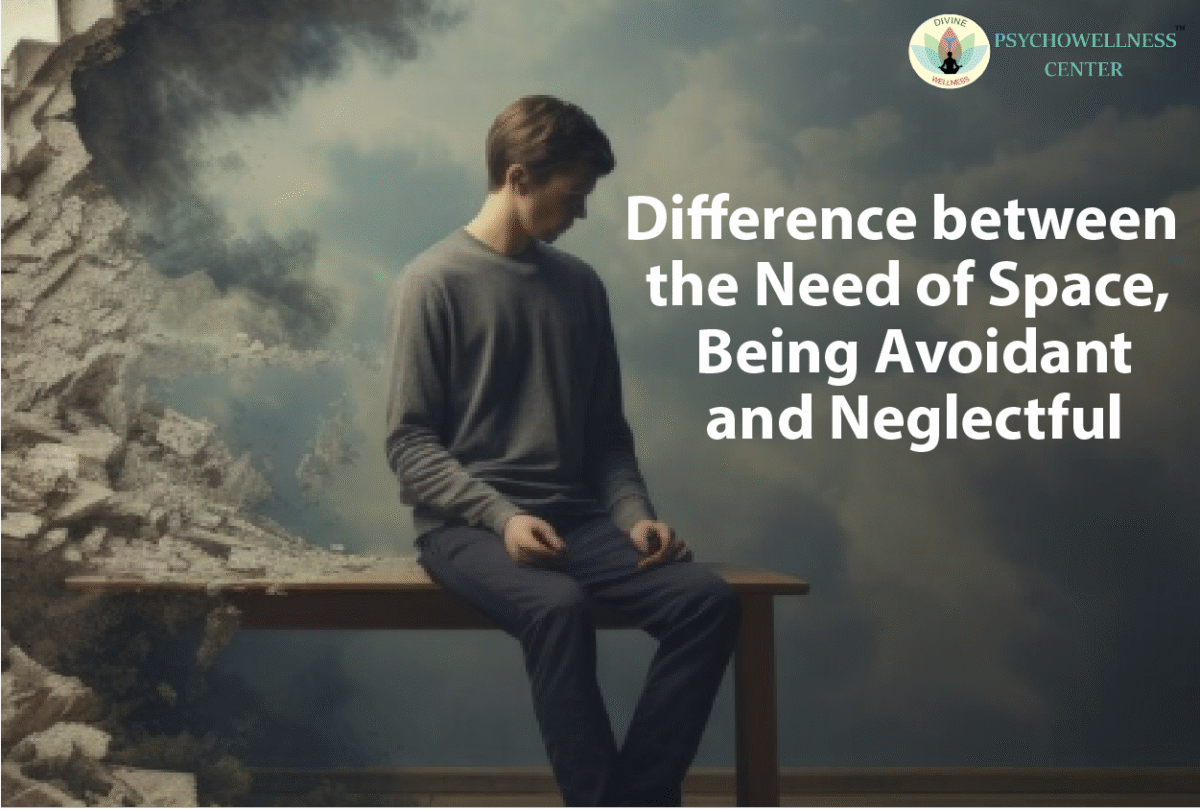In every relationship, whether romantic, familial, or professional, emotional needs and communication styles vary. One of the most misunderstood dynamics arises when someone asks for “space.” Is it a healthy boundary, emotional avoidance, or outright neglect? Knowing the difference between these behaviors is essential to maintaining healthy and respectful relationships.
This blog helps clarify the differences between needing space, being avoidant, and being neglectful, from a psychological and counseling perspective. Understanding these nuances can lead to healthier relationships and stronger emotional connections.
The Need for Space: A Healthy Boundary
The need for space refers to a person’s desire for time alone to recharge, reflect, or process their thoughts. This is normal and healthy, especially for individuals who are introverted or experiencing stress. It doesn’t mean the person is pushing others away; it means they value their own emotional regulation and self-awareness.
Psychologically, this aligns with self-care and emotional intelligence. People who need space usually communicate openly, expressing their boundaries respectfully. For example, they might say, “I need some time to clear my mind, but I’ll reconnect with you later.” This shows a desire for balance, not disconnection. If respected, this can strengthen relationships by reducing unnecessary conflict and preventing emotional burnout.
Being Avoidant: Guarding Emotions or Fear of Intimacy
Avoidant behavior, on the other hand, often comes from emotional fear or past trauma. People who have avoidant tendencies could find intimacy, vulnerability, or emotional reliance unsettling. When discussions get personal or there is disagreement, they could withdraw or get indifferent.
From an attachment theory perspective, avoidant individuals usually had early life experiences that discouraged emotional expression. As adults, they might act independently and be self-sufficient while avoiding emotional conversations or pushing partners away without explanation.
Unlike a healthy need for space, avoidant behavior often lacks clear communication. The person may shut down emotionally, avoid discussing problems, or minimize issues by saying things like “It’s not a big deal.” This leaves others confused, hurt, or disconnected.
Being Neglectful: Consistent Emotional Absence
Neglect in relationships involves a repeated lack of care, emotional presence, or responsiveness. This goes beyond a need for separation or a fear of closeness. It becomes a pattern of emotional abandonment, where one partner continually ignores the needs, messages, or emotional well-being of the other.
Neglectful individuals may not respond to calls or messages for long periods, dismiss emotions as “too much,” or fail to show up in moments of need. The other person feels invisible, ignored, and irrelevant as a result.
While space and avoidance can be managed or healed through communication and therapy, neglect is emotionally harmful. It can lead to deep psychological damage, especially if the neglected individual begins to internalize feelings of worthlessness.
Key Differences Explained
To summarize without a chart:
- Needing space is temporary, communicated respectfully, and rooted in emotional balance.
- Avoidant behavior originates from a dread of or uneasiness with closeness. It typically results in emotional detachment and a lack of communication.
- Neglect is chronic and damaging, showing a consistent lack of attention, interest, or care.
Understanding these distinctions is crucial. While the need for space can benefit a relationship, avoidant and neglectful behaviors, if left unaddressed, may harm it significantly.
How Counseling Can Help
In order to break these patterns, counseling might be an essential tool. Through therapy like CBT, Marriage counseling, Attachment-based therapy, and DBT, individuals and couples can:
- Explore attachment styles
- Learn how to express emotional needs clearly
- Set and respect healthy boundaries
- Address unresolved trauma, anxiety, and depression, which may lead to avoidant or neglectful tendencies
Professional guidance provides a safe space to develop emotional awareness and build deeper, more secure connections.
When Misunderstanding Occurs: How to Navigate the Gray Area
Often in relationships, the line between needing space, being avoidant, and being neglectful isn’t always clear. One partner may feel overwhelmed and ask for space, while the other interprets it as rejection or emotional distance. These misunderstandings can create cycles of insecurity, confusion, or blame. That’s why it’s important to check in with each other, ask for clarity, and express how behaviors affect you emotionally. For instance, “I feel ignored when you don’t respond for days.” Can we talk about how we can both feel supported?” can open the door to healthy dialogue. Relationships need constant work, understanding, and emotional intelligence. It’s as crucial to understand the motivations underlying actions as it is to observe them.
Conclusion
While asking for space can be a sign of emotional maturity and self-awareness, being emotionally avoidant or neglectful may reflect deeper issues needing attention. The difference lies in intention, communication, and emotional impact.
Healthy relationships thrive when individuals are open, responsive, and respectful of one another’s needs. Recognizing and addressing harmful patterns can help build stronger, more compassionate bonds, based on trust, understanding, and emotional security.
Take the first step toward a more balanced and fulfilling life by simply searching “the best therapist near me” and booking a consultation at the Psychowellness Center, conveniently located in Janakpuri or Dwarka, by calling 011-47039812 or 7827208707. For those who prefer the comfort and flexibility of online sessions, the TalktoAngel platform offers expert therapy tailored to your emotional and psychological needs.
Consult Dr. R.K. Suri, a leading clinical psychologist and life coach, and Ms. Sakshi Dhankhar, a renowned counseling psychologist.
References
- Bowlby, J. (1969). Attachment and loss: Vol. 1. Attachment. New York: Basic Books.
- Levine, A., & Heller, R. (2010). Attached: The new science of adult attachment and how it can help you find – and keep – love. New York: TarcherPerigee.
- Johnson, S. M. (2008). Hold me tight: Seven conversations for a lifetime of love. Little, Brown Spark

